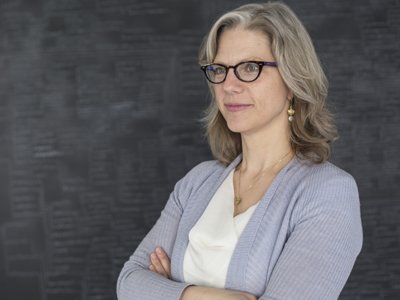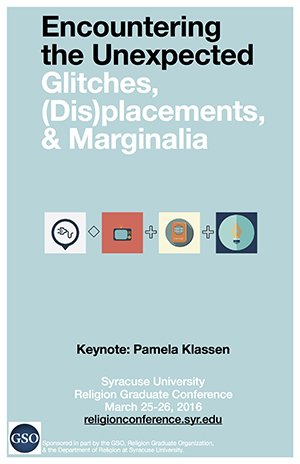Graduate Religion Conference Encourages Unexpected Encounters
Student-organized event offers test run for larger academic gatherings

Organizers of this year’s Religion Graduate Conference designed the March 25 and 26 event to reflect the interdisciplinary nature of Syracuse University’s Department of Religion. “Encountering the Unexpected: Glitches, (Dis)placements, and Marginalia” focuses on the unexpected encounters scholars experience when researching in the archives or collaborating with others.
“There are always all sorts of things you don’t expect when you’re doing research as a graduate student,” says Adam DJ Brett, a PhD student of religion in the College of Arts and Sciences and one of four conference organizers.
Unexpected encounters on the library shelves or in cross-disciplinary or cross-institutional discussions often lead to new ways of understanding, conference organizers say. The conference is “a space to invite other students to try out ideas and get feedback and see what others are doing and be more collaborative across areas of study and across universities,” Brett says. “Doing research can be isolating for graduate students,” he adds.
The two-day event will feature 28 papers, including six by Syracuse graduate students, and a keynote presentation by Pamela Klassen, an expert on the religions of North America and professor of religion at the University of Toronto. Sessions will be held at the Hall of Languages and are free and open to the public. The conference is funded in part by the Graduate Student Organization.

Syracuse’s Religion Graduate Conference also serves as a trial run for students attending the annual conference of the American Academy of Religion (AAR), the world's largest association of religious studies scholars. Brett calls the AAR conference “a massive, four-day extravaganza” that “can be a scary space to navigate.”
The smaller Syracuse conference is “a venue to allow graduate students at SU and elsewhere to present their research in a setting that is a little more informal and experimental,” says Clara Schoonmaker, a PhD student interested in religion and politics in America, religious pluralism, and new religious movements.
She’s presenting a paper entitled “Violent Events: Exploring Ethnographic Ethics,” which grew out of work in Writing Religions and Cultures: Ethnographic Practice, taught in the fall by Ann Grodzins Gold, religion department chair and Thomas J. Watson Professor of Religion and Professor of Anthropology.
Schoonmaker’s paper looks at how ethnographers respond to violence in the field and whether or not it’s ethical to intervene in violent incidents.
Sujata Bajracharya G’17, another conference organizer, is presenting “Dancing as Community: Emotion, Friendship, and Garba-Raas in the South Asian American Diaspora,” also adapted from wok in Gold’s class. Bajracharya’s paper examines connections between folk dance competitions on American college campuses and Navrati, a nine-night Hindu festival that focuses on a specific goddess each night.
Brett’s paper, “Messiahs in America: The Return of Superheros and a Modern American Mythology” is part of his dissertation prospectus. Brett is researching how Messianism plays out in American culture and influences comic books, graphic novels, and books.
Klassen’s keynote, “The Margin Is the Medium: Reading Religion on the Edge of Empire,” is at 7 p.m. Friday, March 25, in the Kilian Room. Klassen’s most recent book, “Spirits of Protestantism: Medicine, Healing, and Liberal Christianity” (University of California Press, 2011) won a 2012 AAR Award of Excellence.
PhD religion student Jordan Loewen organizing the conference has made him appreciate the details involved in presenting such an event. He also learned from the paper selection process.
“It will definitely shape how I will apply in the future,” he says. “I’ll think about how I craft my abstract for people who have no interest or background in my topic. The challenge is to simplify your work without losing what makes it unique.”
